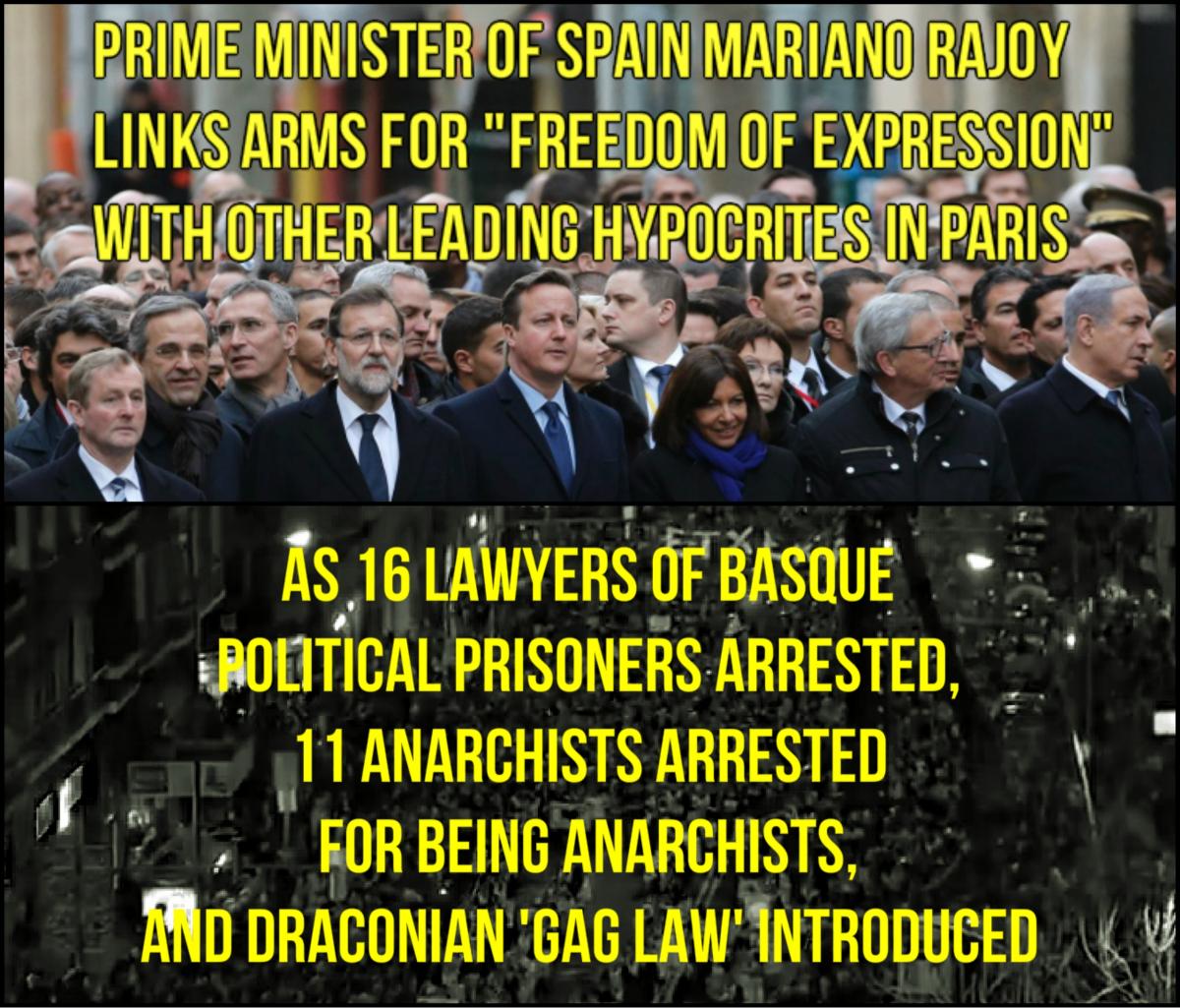Over 30 years of anarchist writing from Ireland listed under hundreds of topics
Spanish PM Postures about 'Freedom of Expression' Despite Repression at Home
The question isn't which of these countries' governments isn't truly committed to freedom of expression, as the Picket Line of Justice would suggest, but which is. Today Spanish police arrested at least 16 lawyers of Basque political prisoners. Three were arrested on their way to the Spanish Special Court for the first day of a mass trial against 35 pro-independence activists. This is only two days after a 80,000 person protest for the rights of Basque political prisoners.
 Also, on December 16th 2014 we saw 11 anarchists in Barcelona area detained in what has been known as "Operation Pandora". All 11 detainees (4 of them were released on charges on December, 18th) are anarchist activists. Solicitors for the accused have stated that they have been arrested for being organised; evidence against the accused is non-existent and desperate. Presiding Judge Bermúdez said “I am not investigating specific acts, I am investigating the organization, and the threat they might pose in the future”, presumably having to stop himself before saying 'Anarchy is on trial'.
Also, on December 16th 2014 we saw 11 anarchists in Barcelona area detained in what has been known as "Operation Pandora". All 11 detainees (4 of them were released on charges on December, 18th) are anarchist activists. Solicitors for the accused have stated that they have been arrested for being organised; evidence against the accused is non-existent and desperate. Presiding Judge Bermúdez said “I am not investigating specific acts, I am investigating the organization, and the threat they might pose in the future”, presumably having to stop himself before saying 'Anarchy is on trial'.
The Draconian Ley De Seguridad Ciudadana, also known as the Ley Mordaza (Gag Law) is a disturbing attack on dissent and protest in Spain. It passed the lower house of Spain's parliament and is due to be passed by the senate in February. It imposes harsh fines (of up to €30,000) for, among other things, demonstrations not officially state-approved, recording the police, and offending Spain, as well as allows blacklisting of dissenting press and political organisations.
It is as clear as ever that Freedom is yet another trifle football for politicians to kick around in their attempts to move up the league tables.
Here is a summary of the new Spanish Gag Law which will be before the senate in February 2015:
'The following actions will be heavily fined [from 600] up to 30,000 Euros:
- Recording, photographing or publishing pictures or videos of the police;
- Demonstrations not formalized by the state;
- Protesting outside of government buildings;
- Refusal to identify yourself to a law enforcement officers;
- Carrying out meetings or assemblies in public spaces;
- Impeding or stopping an eviction;
- Disobedience or resistance to authority or its servants in the performance of their duties;
- Altering public order in a hoodie or any other element that obfuscates your identity;
- Offending or insulting Spain, the autonomous communities, the local authorities or their institutions, symbols, anthems and emblems;
- Demonstrating in places deemed as critical infrastructure such as airports or nuclear plants;
- Celebratory public events that break the prohibition or suspension ordered by authorities.
In addition, the following power has been given to law authorities:
- Police can now have black lists for alternative press, activists and protestors;
- Police can perform external bodily searches at their discretion;
- Random identity checks, which may believe will impact immigrants and minorities the most;
- Government can prohibit any protest if it is deemed that public order will be disrupted.
A recent amendment to the bill would also make it legal for Spanish authorities to immediately deport immigrants, without giving them opportunity for asylum.'

